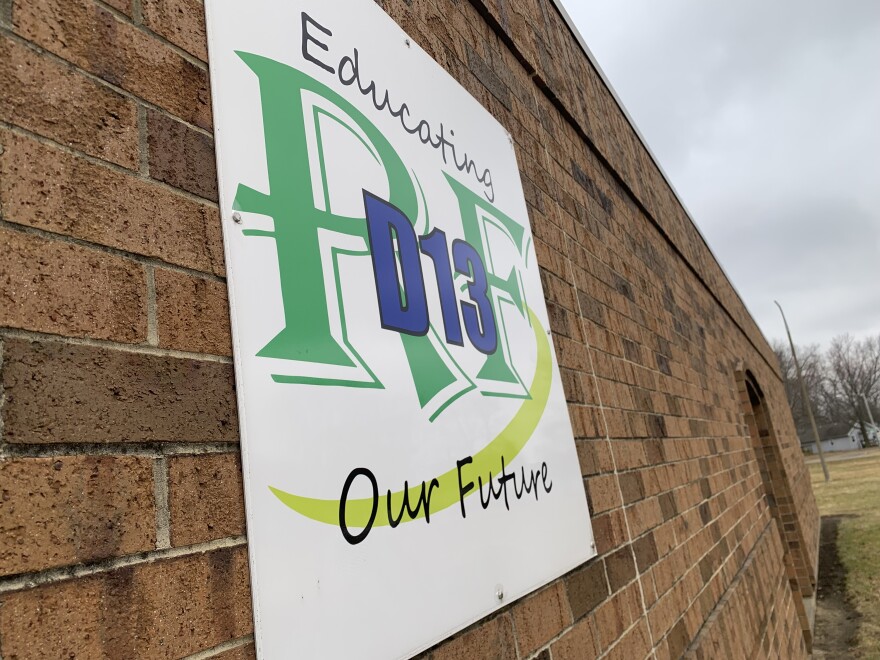In most school districts, the number of students proficient in math and English-language arts fell sharply during the pandemic. That’s according to the Illinois Assessment of Readiness, or IAR, that tests 3rd through 8th-grade students. The number of failing grades shot up as well.
Scores, especially in ELA, started to climb back up a little bit last year. But in Rock Falls District 13 -- a small K-8th district in Whiteside County -- its scores grew back rapidly. Rock Falls students’ scores are growing faster than the average Illinois students with similar scores,
Tara Kristoff is their curriculum director. She says in the summer of 2020, the state board of education released “priority standards' for students to master in math and English-language arts. Those standards were aligned with standardized tests. But there was no IAR testing in 2020.
“That had teachers doing a pretty much a pedagogical shift in their head," said Kristoff, "of, ‘we're not going to be teaching these standards to the test. But we need to make sure students master these standards in order to move on to the next grade level.’”
She says homing in on those priority standards is what kept their students’ scores from dropping off and why they’re growing quickly now. Rock Falls superintendent Dan Arickx says it helps when a small district of 850 -- that’s 70% low income -- has one person leading curriculum and data.
Kristoff meets individually with teachers to talk about student data. They check students’ progress on the priority standards three times a year and devote special focus to whichever they’re struggling with the most. She says they also have a new social-emotional curriculum this year.
In DeKalb, they’re also hoping data-driven teaching will help their students rebound academically. They’re a much bigger district than Rock Falls and starting this year they now have two people working with teachers on data and interventions.
Sarah Schaefer is one of them. She’s the elementary STEAM Manager at DeKalb Public schools.
Their district is also doubling down on collaboration between teachers. And this year, they just created Professional Learning Communities at the elementary school level. That’s where teachers from the same grade level or same subject meet for a few hours every other week to look at data and identify trends from their classrooms.
Schaefer says at the middle school level they now have a 30-minute “WIN” period every day.
“‘WIN” stands for ‘what I need,’ she said. "So, if a student is struggling in math, they would go and spend their WIN period doing remediation for math."
Ben Epperson is the executive director of curriculum at Rockford Public Schools -- one of the largest districts in Illinois.
“A lot of the struggle," he said, "whether we're talking math or science or English or anything, really boils down to a lot of social emotional impacts that the students experienced.”
Epperson says they shifted their curriculum prior to the pandemic to make student interaction a more crucial part to how they engage with math instruction. Now students are in the classroom and can interact much more easily than when they were learning online. But, he says, the social part of the equation has still been a challenge.
Epperson says that equity is a massive part of student progress. Rockford IAR scores slightly improved in 2022. But twice as many Black students don’t meet standards compared with white students.
He says they’re also hoping data can help close those gaps. Last year, they rolled out an initiative that created eight “standards of practice” for each RPS school that they can monitor throughout the school year. They can be strategic, academic or social-emotional.
There’s support for these moves at the state level.
Dr. Jen Kirmes is the Executive Director for Teaching & Learning at the Illinois State Board of Education. She says this year the Illinois report card includes an “Equity Journey Continuum.”
“It gives local communities and school leaders a place to start," said Kirmes, "and reflect on ‘where are the places in their own practices and systems where outcomes are not equitable?’”
She says the state’s evidence-based funding system has also made a substantial difference, allowing schools to start programs and invest in new curriculum through the pandemic.
Kirmes says it’s also a reason the state stood out in some national metrics. According to the nation’s report card, Illinois was one of only two states that didn’t see 4th-grade math scores decline from 2019-2022.
And for schools like Rock Falls, the goal isn’t just to get back to where they were before the pandemic in 2019. They hope academic and social-emotional investments will make their students more successful than ever.


